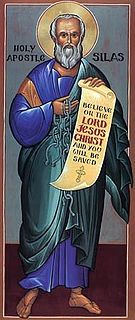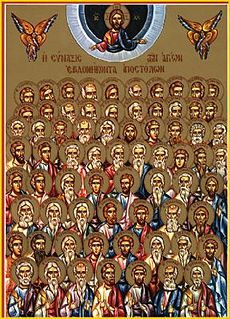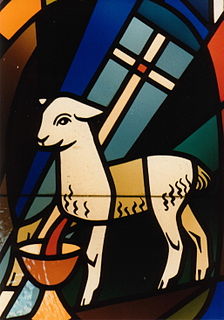Related Research Articles

The Acts of the Apostles, often referred to simply as Acts, or formally the Book of Acts, is the fifth book of the New Testament; it tells of the founding of the Christian church and the spread of its message to the Roman Empire.

Barnabas, born Joseph, was according to tradition an early Christian, one of the prominent Christian disciples in Jerusalem. According to Acts 4:36, Barnabas was a Cypriot Jew. Named an apostle in Acts 14:14, he and Paul the Apostle undertook missionary journeys together and defended Gentile converts against the Judaizers. They traveled together making more converts, and participated in the Council of Jerusalem. Barnabas and Paul successfully evangelized among the "God-fearing" Gentiles who attended synagogues in various Hellenized cities of Anatolia.

Paul the Apostle, commonly known as Saint Paul and also known by his Hebrew name Saul of Tarsus, was a Christian apostle who spread the teachings of Jesus in the first-century world. Generally regarded as one of the most important figures of the Apostolic Age, he founded several Christian communities in Asia Minor and Europe from the mid-30s to the mid-50s AD.
Judas was Judas Iscariot, the apostle of Jesus who betrayed him.

Silas or Silvanus was a leading member of the Early Christian community, who first accompanied Paul the Apostle on his second missionary journey.

The First Book of Maccabees, also called 1 Maccabees, is a book written in Hebrew by an anonymous Jewish author after the restoration of an independent Jewish kingdom by the Hasmonean dynasty, around the late 2nd century BC. The original Hebrew is lost and the most important surviving version is the Greek translation contained in the Septuagint. The book is held as canonical scripture by the Catholic, Orthodox, and Oriental Orthodox churches, but not by Protestant denominations nor any major branches of Judaism; it is not part of the Tanakh. Some Protestants consider it to be an apocryphal book.
The Church of Antioch was one of the five major churches of the pentarchy in Christianity before the East–West Schism in 1054, with its primary seat in the ancient Greek city of Antioch.
Joses is a name, usually regarded as a form of Joseph, occurring many times in the New Testament:
The Zealots were a political movement in 1st-century Second Temple Judaism which sought to incite the people of Judea Province to rebel against the Roman Empire and expel it from the Holy Land by force of arms, most notably during the First Jewish–Roman War (66–70). Zealotry was the term used by Josephus for a "fourth sect" or "fourth Jewish philosophy" during this period.

The seventy disciples or seventy-two disciples were early emissaries of Jesus mentioned in the Gospel of Luke. According to Luke, the only gospel in which they appear, Jesus appointed them and sent them out in pairs on a specific mission which is detailed in the text.
In the Acts of the Apostles, Joseph Barsabbas is one of two candidates qualified to be chosen for the office of apostle after Judas Iscariot lost his apostleship when he betrayed Jesus and committed suicide. After the casting of lots he was not chosen, the lot instead favoring Matthias to be numbered with the remaining eleven apostles.
The incident at Antioch was an Apostolic Age dispute between the apostles Paul and Peter which occurred in the city of Antioch around the middle of the first century. The primary source for the incident is Paul's Epistle to the Galatians 2:11–14. Since Ferdinand Christian Baur, biblical scholars have found evidence of conflict among the leaders of early Christianity; for example James D. G. Dunn proposes that Peter was a "bridge-man" between the opposing views of Paul and James the brother of Jesus. The final outcome of the incident remains uncertain, resulting in several Christian views on the Old Covenant.

The following outline is provided as an overview of and topical guide to Christianity:

Acts 15 is the fifteenth chapter of the Acts of the Apostles in the New Testament of the Christian Bible. It records Paul and Barnabas traveling to Jerusalem to attend the Council of Jerusalem and the beginning of Paul's second missionary journey. The book containing this chapter is anonymous but early Christian tradition uniformly affirmed that Luke composed this book as well as the Gospel of Luke.
The historical reliability of the Acts of the Apostles, the principal historical source for the Apostolic Age, is of interest for biblical scholars and historians of Early Christianity as part of the debate over the historicity of the Bible.
Binding and loosing is originally a Jewish Mishnaic phrase also mentioned in the New Testament, as well as in the Targum. In usage, to bind and to loose simply means to forbid by an indisputable authority and to permit by an indisputable authority. One example of this is Isaiah 58:5-6 which relates proper fasting to loosing the chains of injustice.

Acts 16 is the sixteenth chapter of the Acts of the Apostles in the New Testament of the Christian Bible. It records the second missionary journey of Paul, together with Silas and Timothy. The book containing this chapter is anonymous but early Christian tradition uniformly affirmed that Luke composed this book as well as the Gospel of Luke.
This is a list of the bishops of Jerusalem before the Council of Chalcedon (451), which provoked a schism.

The names Simon and Simeon appear 71 times and 8 times in the New Testament, respectively. Simon was a very common given name in the historical period and region of Jesus, but surnames were still very rare. It is therefore not always clear which person these names refer to, and whether some refer to the same person or distinct characters, which has led to confusion. Therefore, Christian authors and modern scholars have given these men names based on their known attributes.
References
- ↑ Douglas, J D; Tenney, Merrill, eds. (1 October 1987), "Barsabbas", New International Bible Dictionary, Grand Rapids: Zondervan, p. 126, ISBN 978-0-310-33190-2 , retrieved 13 January 2013
- ↑ Acts 15:34 ; text not present in all manuscripts